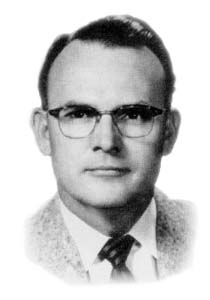- John E.
Moss: An appreciation
By Paul McMasters, ombudsman
12.8.97
John E. Moss, legislative father of the Freedom of Information Act. Every American who wants democracy to work the way it's supposed to owes a debt to John E. Moss. The former California congressman, who died last Friday at age 84, did more than any elected official, before or since, to further the cause of good government by championing the citizen's right to know.
Moss was known as the "father of the Freedom of Information Act." The 1966 law allowed ordinary citizens to tap enormous stores of information that the government had amassed on their behalf and at their expense.
Before that law, even the most rudimentary request for information could be ignored; today, federal agencies struggle to process more than 600,000 requests a year.
Almost from the time he came to Congress in 1953, the former appliance salesman and real estate agent from the Central Valley was doggedly determined to make government work better by providing citizens with more information about its operations. He railed at the inability to get even the most basic information out of recalcitrant federal agencies. If a member of Congress has trouble getting access to government information, he once told an interviewer, what about the ordinary citizen?
Opening the doors of government wasn't easy. Moss struggled against congressional apathy, executive antipathy, and public indifference for more than a decade to get a law enacted on July 4, 1966. It was a bittersweet victory. President Johnson held the law until a day before it would have been pocket-vetoed, then signed it at his ranch far from the nation's capital, without ceremony, without television cameras, without special pens struck for the occasion -- and without inviting the man who made it happen, John E. Moss.
Even then, there was no rush by citizens to use their new-found ability to access information. In fact, not until the Watergate era did the trickle of requests begin to turn to a flood.
After Moss retired and returned to California in 1978, Ward Sinclair wrote in The Washington Post: "By the time Moss left Washington, he had achieved something that others can lay only spurious claim to: an imprint on the way life is lived in the United States, an imprint on the way government governs."
John E. Moss was neither lawyer nor scholar, but his work in Washington demonstrated that he understood better than most the Jeffersonian principle that a democracy's best and only hope is an informed citizenry.